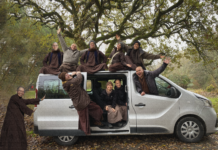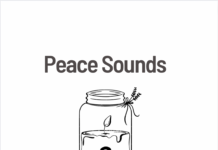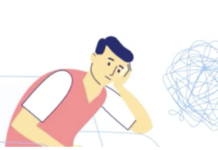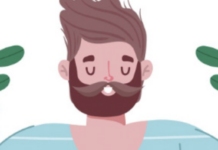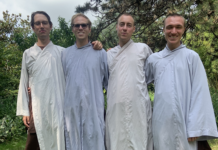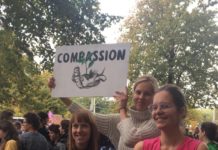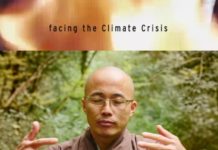Jan from Wake Up Nijmegen and Susanne from Wake Up Oslo share about their experiences and insights from attending the Empathy and Compassion Conference in Society conference in Oslo, Norway, in October 2016.
Doing the Inner Work for Positive Change in Society
by Jan
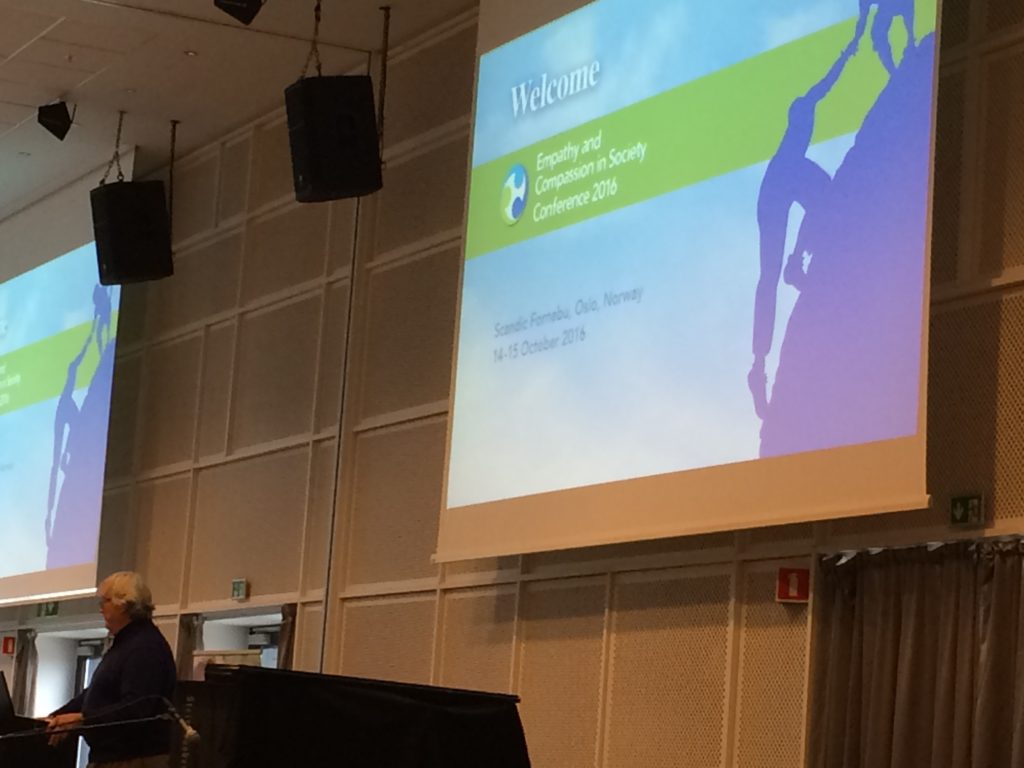 I have attended many kinds of international conferences. However, this one about empathy and compassion was distinctively different than the ones I’ve been to before. This international conference in Oslo, Norway, was a place where my secular, public role as a healthcare professional met with my personal self as a meditation practitioner. It was quite an exciting experience because quite often, these two parts of me feel like worlds apart from each other. Ironically, as it turned out in this event, scientific research consistently points out that these two selves are not so far apart from each other. Practicing mindfulness and compassion have a significant positive effect on our mental, emotional, and even physical health and well-being. Thanks to the extensive research of scientists like Ellen J. Langer, Jon Kabat-Zinn, Paul Gilbert and Richard Davidson, our academic and healthcare communities are starting to embrace contemplative practices such as meditation. In short, the practice of accepting the here and the now is finally becoming “accepted” by modern, evidence-based healthcare.
I have attended many kinds of international conferences. However, this one about empathy and compassion was distinctively different than the ones I’ve been to before. This international conference in Oslo, Norway, was a place where my secular, public role as a healthcare professional met with my personal self as a meditation practitioner. It was quite an exciting experience because quite often, these two parts of me feel like worlds apart from each other. Ironically, as it turned out in this event, scientific research consistently points out that these two selves are not so far apart from each other. Practicing mindfulness and compassion have a significant positive effect on our mental, emotional, and even physical health and well-being. Thanks to the extensive research of scientists like Ellen J. Langer, Jon Kabat-Zinn, Paul Gilbert and Richard Davidson, our academic and healthcare communities are starting to embrace contemplative practices such as meditation. In short, the practice of accepting the here and the now is finally becoming “accepted” by modern, evidence-based healthcare.
Besides the pretty straightforward research results on the positive effects of meditation on the brain that were presented during these two days in Oslo, there was another message that I thought was particularly exciting to bring home with me from the Norwegian capital. This idea was not so much based on science, but therefore by no means less interesting.
Scylla Elworthy, a global leader in peace-building and social development, reminded us of the simple idea that in order to create lasting peace in the world, we have to continue to build peace within ourselves as well. As she put it: “In order to make the world a better place, we have to do the inner work.”
To be successful in our ambitions to move ourselves and the world forward, we have to continue the practice of introspection (meditation). She pointed out that as an advisor to dozens of development projects, she has seen many excellent social and health initiatives fall apart because the people involved failed to continue to pay attention to how certain events or situations were interrelated with their own inner world. The neglect of introspection bears the risk of exporting an inner conflict – within ourselves – into the outer world or vice versa. We can fail to see that our anger, fear, or passion are emotions that find their origins within ourselves. In this way we cannot prevent ourselves from projecting those strong emotions on the people or world around us right away. Our frustrations can be prompted by the outer world, but they happen within us. Our passion can be elicited by the other, but yet that feeling is within us.
Not seeing this nuance can result in blame, resentment, or hate for others (and for ourselves as well). Obviously we will be confronted with events, people, or situations that are understandably provoking intense emotions. Practicing mindfulness can help us to be more aware of this interdependence between emotion, our experience, and a situation. Therefore, training introspection is providing us with more freedom and insight to respond to a specific situation, person, or an emotion in a more effective way. In our highly interdependent world, society and daily life, having a deeper insight into these things can be pretty beneficial, if not essential.
Therefore, if we want to build a better world, we should not forget to continue to do the inner work. After all, as Thich Nhat Hanh said: “The way out is in.”
Taking Care of the Missing Hole in Our Hearts
by Susanne Xuan Tam Trinh
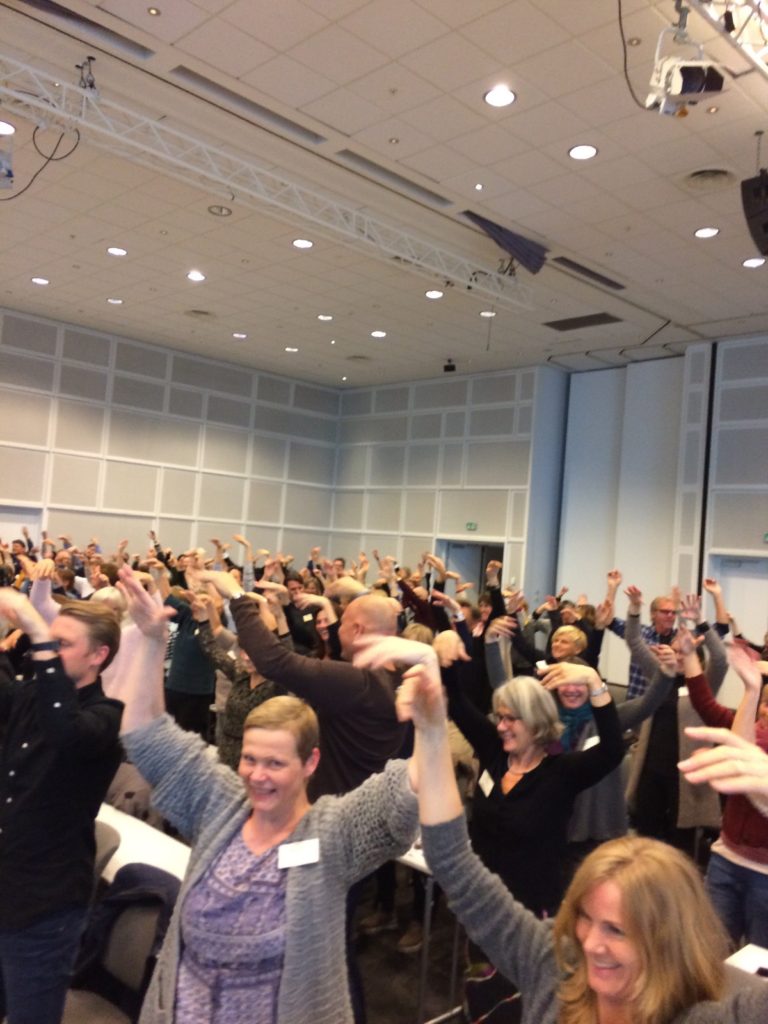 While attending the Compassion and Empathy conference in Oslo, Norway, one phrase kept repeating in my head: “Maybe one of the reasons we come to Plum Village is that we have a missing hole in our hearts. Many of us run in ten different directions to fill this missing hole.” These sentences were told to me during a Dharma talk shared by Sr. Tue Nghiem in the 2015 summer retreat at Plum Village, and it reflected the collective energy I felt at the conference room. I got the impression that the people surrounding me were running and came to this conference to fill the missing hole in their hearts. Every one of us had our own missing hole with different needs and tried our best to embrace it.
While attending the Compassion and Empathy conference in Oslo, Norway, one phrase kept repeating in my head: “Maybe one of the reasons we come to Plum Village is that we have a missing hole in our hearts. Many of us run in ten different directions to fill this missing hole.” These sentences were told to me during a Dharma talk shared by Sr. Tue Nghiem in the 2015 summer retreat at Plum Village, and it reflected the collective energy I felt at the conference room. I got the impression that the people surrounding me were running and came to this conference to fill the missing hole in their hearts. Every one of us had our own missing hole with different needs and tried our best to embrace it.
The first day of the conference focused on scientific proofs that showed what impact mindful practices could give to one’s self and healthcare environments. As I am eighteen years old, this conference did not give me the insight I was looking for. Instead, it gave me hope to see adults figuring out what gives them happiness to their lives and working environment. Before, I had no idea that so many Norwegian adults shared this thought about mindfulness.
The conference itself did not bring me new knowledge about my mindfulness practice, but it did refresh my understanding. I still was not as satisfied with the talks as other participants, which bothered me a lot. How come all these beautiful talks shared by these amazing scientists and motivators have no impact on me at all?
It was not until the Q&A panel that I finally recognized parts of my missing hole. I had a perception about what it was being mindful. I wanted to continuously learn and be as touched as the 2015 summer retreat I attended at Plum Village. I kept making a story, which I packed in a box that remained unchanged. However, nothing could give me the same pleasure and fulfilling feeling. I wanted to recreate the past, but this conference was the present. I found out that I labeled mindfulness with a specific feeling I got during that summer retreat, and it made me suffer. Instead of recognizing and taking care of my missing hole, I was chasing after a feeling that could fulfill my unreachable expectation. I stopped breathing.
The questions asked by the adults made me realize how complicated we make our lives. I realized how we drown our questions with unnecessary details. When we grow up, we tend to make it more difficult than necessary. Happiness is to enjoy and look at the simple things. Do not get caught by the labels, or the ideas and expectations. Keep rewriting the story you are telling yourself. Holding on to permanence causes a lot of suffering. Most important thing of all, no matter how many conferences, talks, or books about mindfulness you encounter, remember to ask yourself: “Should I continue reading and listening about mindfulness breathing, or should I actually breathe mindfully right now?”
Let’s breathe now.

